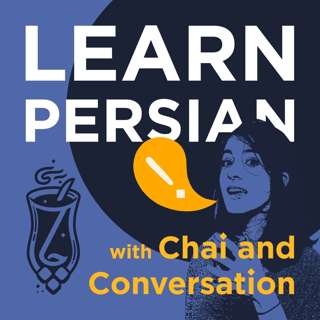
Interview | Growing Up Irooni- Caspian Chef discusses returning to his Iranian roots after decades of assimilation
In this Growing Up Irooni we talk to Omid Roustaei, better known as the Caspian Chef. In this conversation, we discuss the process of coming to the United States on his own and figuring out his own path for assimilating into American culture as a means of survival. Omid has has a very rich and varied path, first studying biotech engineering, and then becoming a personal chef and yoga teacher, to pursuing a career in psychotherapy, to returning to cooking and his Iranian roots only in the past few years.This was one of the most fascinating conversations I've had- and we really go into some territory that I think will resonate with so many of us- life is certainly not linear, and we can see that in Omid's story. We talk about career and pursuing your dreams- he first went down the ‘traditional Iranian path' of becoming a biotech engineer and worked in that field for a while, before pivoting to the perhaps more American notion of pursuing his passion- cooking and psychotherapy. We also talked about the process of assimilation as a coping mechanism- what it means to arrive in a country and need to fit in. And finally, what led Omid back to the path of rediscovering his Iranian roots- from cooking Persian food, to becoming reacquainted with the Persian language, and to ultimately seek out and become part of the Iranian diaspora community again.I hope you enjoy the conversation as much as I did!Related links:The Caspian Chef blogGhormeh Sabzi blog postThe Caspian Chef instagram pageMy Persian Corner instagram pageEnglish with Bardia instagram pageStationary Shop by Marjan Kamali
11 Maj 202258min

Poetry | Saadi's bani ādam Part 3
In this final part of the discussion of Bani Adam by Saadi, we go over the last two lines of the poem, and review the entire poem in its entirety as well.
31 Jan 202211min

Poetry | Saadi's bani ādam Part 2
In this lesson, we'll go over the first part of the poem bani ādam and learn the individual words and phrases of this section of the poem.
23 Jan 202218min

Poetry | Saadi's bani ādam Intro
In this poetry episode, we go over one of the most famous poems of the Persian language, bani ādam, by the poet Saadi. We will learn about Saadi and what made him such a unique voice, and then we'll go over this poem specifically. We're joined in this episode by musician Fared Shafinury.
9 Dec 202126min

Poetry | Rumi's beshnō een nay Part 4
In this lesson, we're going to go over the final part of the poem beshnō een nay by Rumi. We will go over the Persian words and phrases learned in this part of the poem.
5 Juli 202116min

Poetry | Rumi's beshnō een nay Part 3
In this third part of our discussion of Rumi's beshnō een nay, we go over the middle part of the poem, and learn the words and phrases associated with this part of the poem.
28 Juni 202119min

Poetry | Rumi's beshnō een nay Part 2
In this lesson, we're going to go over the first four lines of the poem beshnō een nay, (also known as beshnō az nay- we explain this in the lesson) and learn the vocabulary and phrases associated with the poem. We also learn other vocabulary words related to the ones learned in this part of the poem. Translation by Persian Poetics.
21 Juni 202120min

Poetry | Rumi's beshnō een nay Intro
In this lesson, we go over one of Rumi's most famous poems, beshnō een nay, which means ‘listen to the reed flute,' with our friend Muhammad Ali of Persian Poetics. We go over the essence and meaning behind the poem, and analyze it line by line using Muhammad Ali's English translation. Beshnō een nay is the first poem in Rumi's Masnavi, and is a common poem for Iranians to have memorized. The major theme of the poem is that of separation, either from a specific place or from the divine, and the return to the ‘self,' whatever that may be.
9 Juni 202147min





















